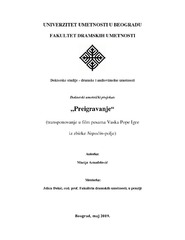"Преигравање" (Транспоновање у филм песама Васка Попе Игре из збирке поезије Непочин поље"
Metapodaci
Prikaz svih podataka o zapisuDoktorand:
Аранђеловић, МаријаFakultet:
Факултет драмских уметностиDatum odbrane:
29-01-2020Mentor:
Ђокић, ЈелицаČlanovi komisije:
- Бајић, Дарко
- Терзић, Горан
- Копривица, Стеван
- Стојановић Пантовић, др Бојана
Sažetak
APSTRAKT
Ovaj umetnički projekat bavi se različitim estetikama kratkih filmskih formi kroz niz kratkih filmova koje sam napravila a čija je osnovna inspiracija bio ciklus pesama Vaska Pope Igre, iz zbirke pesama Nepočin polje (1956). U svetu poezije Vaska Pope, čitav svet, živ i neživ, trči, skače, sapliće se i pada, smeje se, rže, sanja, drugim rečima u njemu je sve moguće- baš kao i na filmu. Namera je, s toga, da se kroz svojevrsni omaž poetskom svetu i stvaralaštu ovog jugoslovenskog (jer on je sebe smatrao Jugoslovenom) pesnika, čija je poezija autentična i prepoznatljiva i vrlo dinamična, preispita dosadašnji spoj filma i poezije kao dve umetnosti koje se prepliću na mnogo nivoa. Šta je poetično u filmu, šta je poezija filma a šta filmska poema? Teoretski okvir na kome će se pisani deo rada zasnivati je prvenstveno istorijski osvrt na autore koji su tragali za poetskim u filmu. Žermen Dilak (Germaine Dulac), Luj Delik (Louis Delluc), Men Rej (Man Ray), Hans Rihter (Hans Richter)..., Dziga Vertov (Dziga Vertov) i kasnije Maja Deren (Maya Deren) i Sten Brakidž (Stan Brakhage) smatrali su film dominantno vizuenim medijem, i shodno tome sav uticaj poezije videli su u slobodnom tretiranju vizuelne predstave sveta, drugim rečima poetika je trebalo da bude sadržana u istraživanju potencijala vizuelne prirode filma. Tako gledano i mnoge reditelje klasičnog, narativnog filma, možemo nazvati poetskim stvaraocima. Terens Malik (Terrence Malick), Andrej Tarkovski (Andrei Tarkovski) i drugi poznati reditelji, pre svega prikazuju stanja duha, dok je dramski zaplet od sekundarnog značaja. S druge strane, poezija može biti i najdirektnije inkorporirana u filmsko delo, tj. može biti deo zvučne slike filma ili njen alfabetski prikaz može biti sastavni deo vizuelnog sadržaja filma. Ovo je umetničko istraživanje, spoj teorije i prakse, u kome će umetnički kreativni deo imati primat i kroz njegovu analizu će se ponajviše postavljati pitanja i tragati za odgovorima na nedoumice u potrazi za poetskim slojevima filmske umetnosti. Analiza umetničkog projekta sastavni su deo ovog rada, kao i sam film, koji je priložen u elektronskom formatu.
ABSTRACT
This art project considers various esthetics of short film forms through the series of short films I had made with poem cycle Games by Vasko Popa (part of his book of poems Field of No Rest, originally published in 1956) as basic inspiration. In Vasko Popa‟s poetry every aspect of the world – living or inanimate – runs, jumps, tumbles and falls, laughs, roars, dreams… In other words, everything is possible there, as is in a film. Intention therefore is to - through the homage to the poetic and creative world of this Yugoslav (for he considered himself Yugoslav) poet whose work is authentic, dynamic and recognizable – reexamine the connection between film and poetry, two art forms intertwined on many levels, through history. What is considered to be poetic in a film? What is the poetry of a film? What is a filmed poem? Theoretical confine inside which the written segment of the work will be based is primarily the historical recollection to authors who searched for poetic possibilities of a film. Germaine Dulac, Louis Delluc, Man Ray, Hans Richter, Dziga Vertov and later Maya Deren and Stan Brakhage, respectively, considered film to be a dominantly visual medium. They had regarded the influence of poetry through the freedom of world‟s visual representation. In other words, poetry should be included into the exploration of the visual nature of film. Looked from that angle, many representatives of narrative film could be seen as creators of poetry. Terrence Malick, Andrei Tarkovsky and other well known directors, more than anything else, represent states of spirit, with dramatic plot as a secondary tool. On the other hand, poetry can be incorporated into the film in the most direct possible way, i.e., it can be a part of the auditory aspect of the film, or its alphabetical representation can be an integral part of film‟s visual content. This is an artistic exploration, theory and material form combined, in which the creative process will be of primary importance. Through its analysis questions will be raised and answers will be looked for, considering the search for poetic layers of cinematic art. Analysis of the art project is the integral part of the work, as is the film itself, enclosed in digital form.

